Mises, Ludwig von. Human Action: A Treatise on Economics
Подождите немного. Документ загружается.

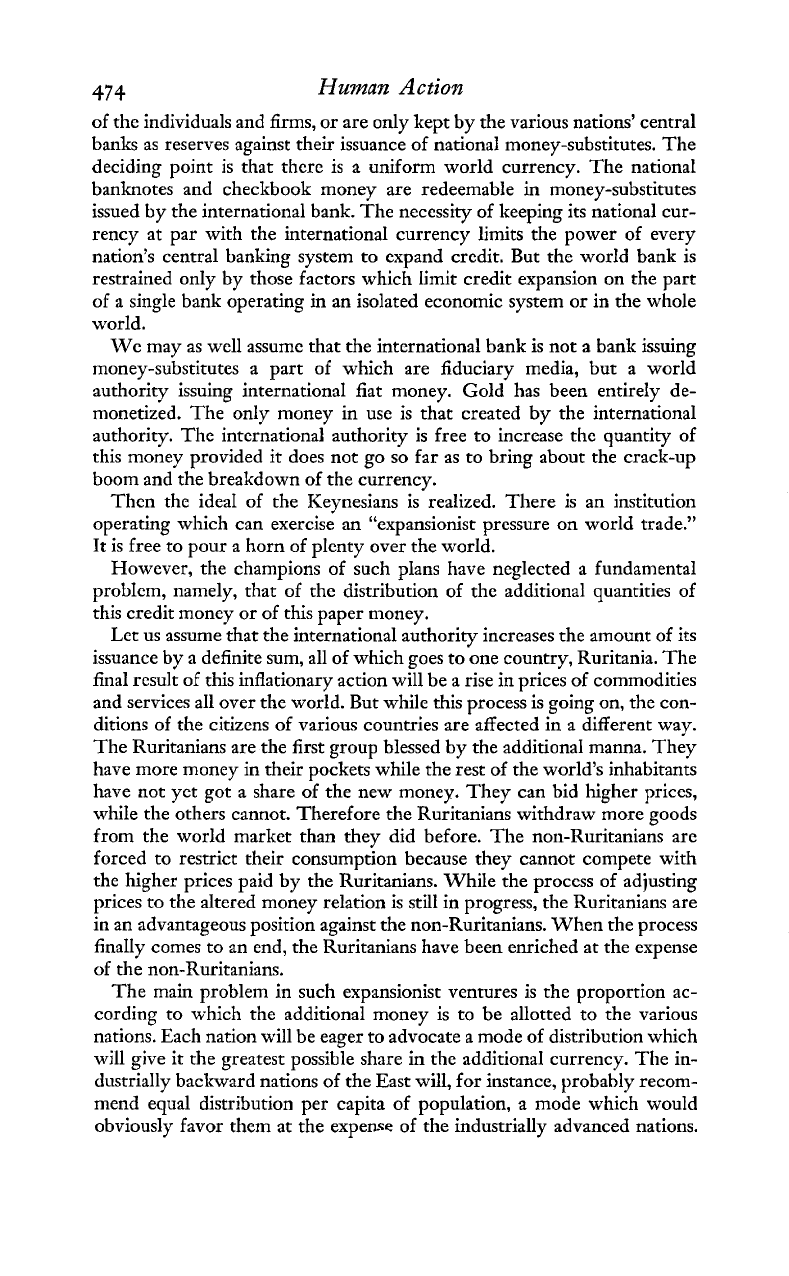
474
Human
Action
of the individuals and firms, or are only kept by the various nations' central
banks as reserves against their issuance of national money-substitutes. The
deciding point is that there is a uniform world currency. The national
banknotes and checkbook money are redeemable in money-substitutes
issued by the international bank. The necessity of keeping its national eur-
rency at par with the international currency limits the power of every
nation's central banking system to expand credit. But the world bank is
restrained only by those factors which limit credit expansion on the part
of a single bank operating in an isolated economic system or in the whole
world.
We may as well assume that the international bank is not a bank issuing
money-substitutes a part of which are fiduciary media, but a world
authority issuing international fiat money. Gold has been entirely de-
monetized. The only money in use is that created by the international
authority. The international authority is free to increase the quantity of
this money provided it does not go so far as to bring about the crack-up
boom and the breakdown of the currency.
Thcn the ideal of the Keynesians is realized. There is an institution
operating which can exercise an "expansionist prcssure on world trade."
It is free to pour a horn of plenty over the world.
However, the champions of such plans have neglected a fundamental
problem, namely, that of the distribution of the additional quantities of
this credit money or of this paper money.
Let us assume that the international authority increases the amount of its
issuance by a definite sum, all of which goes to one country, Ruritania. The
final result of this inflationary action will be a rise in prices of commodities
and services all over the world. But while this process is going on, the con-
ditions of the citizens of various countries are affected in a different way.
The Ruritanians are the first group blessed by the additional manna. They
have more money in their pockets while the rest of the world's inhabitants
have not yet got a share of the new money. They can bid higher prices,
while the others cannot. Therefore the Ruritanians withdraw more goods
from the world market than they did before. The non-Ruritanians are
forced to restrict their consumption because they cannot compete with
the higher prices paid by the Ruritanians. While the process of adjusting
prices to the altered money relation is still in progress, the Ruritanians are
in an advantageous position against the non-Ruritanians. When the process
finally comes to an end, the Ruritanians have been enriched at the expense
of the non-Ruritanians.
The main problem in such expansionist ventures is the proportion ac-
cording to which the additional money is to be allotted to the various
nations. Each nation will be eager to advocate a mode of distribution which
will give it the greatest possible share in the additional currency. The in-
dustrially backward nations of the East will, for instance, probably recom-
mend equal distribution per capita of population, a mode which would
obviously favor them at the expenw of the industrially advanced nations.
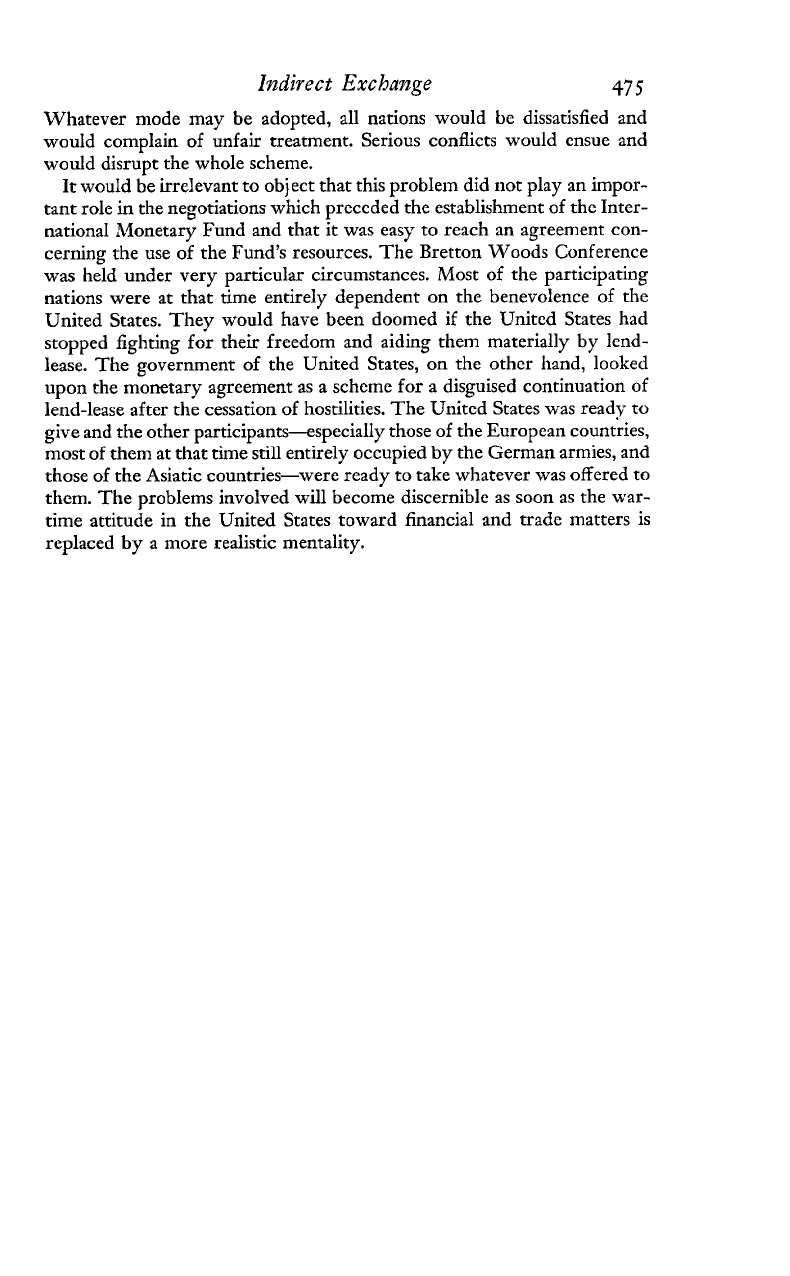
Indirect
Exchange
47
5
Whatever mode may be adopted, all nations would be dissatisfied and
would complain of unfair treatment. Serious conflicts would ensue and
would disrupt the whole scheme.
It wouId be irrelevant to object that this problem did not play an impor-
tant role in the negotiations which preceded the establishment of the Inter-
nationaI Monetary Fund and that it was easy to reach an agreement con-
cerning the use of the Fund's resources. The Bretton Woods Conference
was held under very particular circumstances. Most of the participating
nations were at that time entirely dependent on the benevolence of the
United States. They would have been doomed if the United States had
stopped fighting for their freedom and aiding them materially by lend-
lease. The government of the United States, on the other hand, looked
upon the monetary agreement as
a
scheme for a disguised continuation of
lend-lease after the cessation of hostilities. The United States was ready to
give and the other participants-especially those of the European countries,
most of them at that time still entirely occupied
by
the German armies, and
those of the Asiatic countries-were ready to take whatever was offered to
them. The problems involved will become discernible as soon as the war-
time attitude in the United States toward financial and trade matters is
replaced
by
a more realistic mentality.
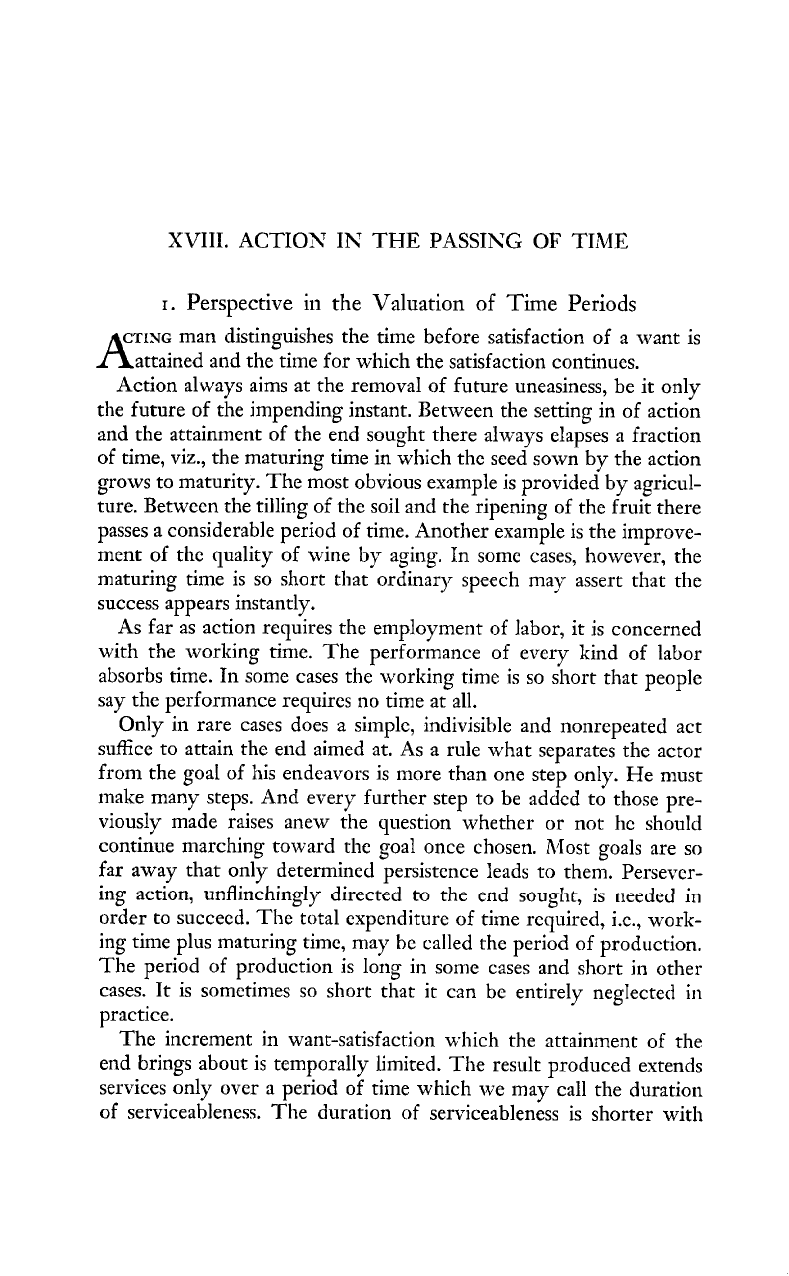
XVIII. ACTION IN
THE
PASSING OF TIME
I.
Perspective
in
the Valuation
of
Time Periods
CTING
man distinguishes the time before satisfaction of a want is
A
attained and the time for which the satisfaction continues.
Action always aims at the removal of future uneasiness, be it only
the future of the impending instant. Between the setting in of action
and the attainment of the end sought there always elapses a fraction
of time, viz., the maturing time in which the seed sown by the action
grows to maturity. The mast obvious example is provided by agricul-
ture. Between the tilling of the soil and the ripening of the fruit there
passes a considerable period of time. Another example is the improve-
ment of the quality of wine by aging. In some cases, however, the
maturing time is so short that ordinary speech may assert that the
success appears instantly.
As far as action requires the employment of labor, it is concerned
with the working time. The performance of every kind of labor
absorbs time. In some cases the working time is so short that people
say the performance requires no time at all.
Only in rare cases does a simple, indivisible and nonrepeated act
suffice to attain the end aimed at. As a rule what separates the actor
from the goal of his endeavors is more than one step only. He must
make many steps. And every further step to be added to those pre-
viously made raises anew the question whether or not
hc
should
continue marching toward the goal once chosen. Most goals are so
far away that only determined persistence leads to them. Persever-
.--
..,.+.,,-
.--n:-nl.:--l.v
.---
..-
kf;
dLL;VlL,
UIIIIIIICLI~~I~;~~
&CLLC~
to
ihe
eiid
soiight,
is
rieeded
in
order to succeed. The total expenditure of time required,
i.e.,
work-
ing time plus maturing time, may be called the period of production.
The period of production is long in some cases and short in other
cases. It is sometimes so short that it can be entirely negIectcd
in
practice.
The increment in want-satisfaction which the attainment of the
end brings about is temporally limited. The result produced extends
services only over a period of time which we may call the duration
of
serviceableness. The duration of serviceableness is shorter with
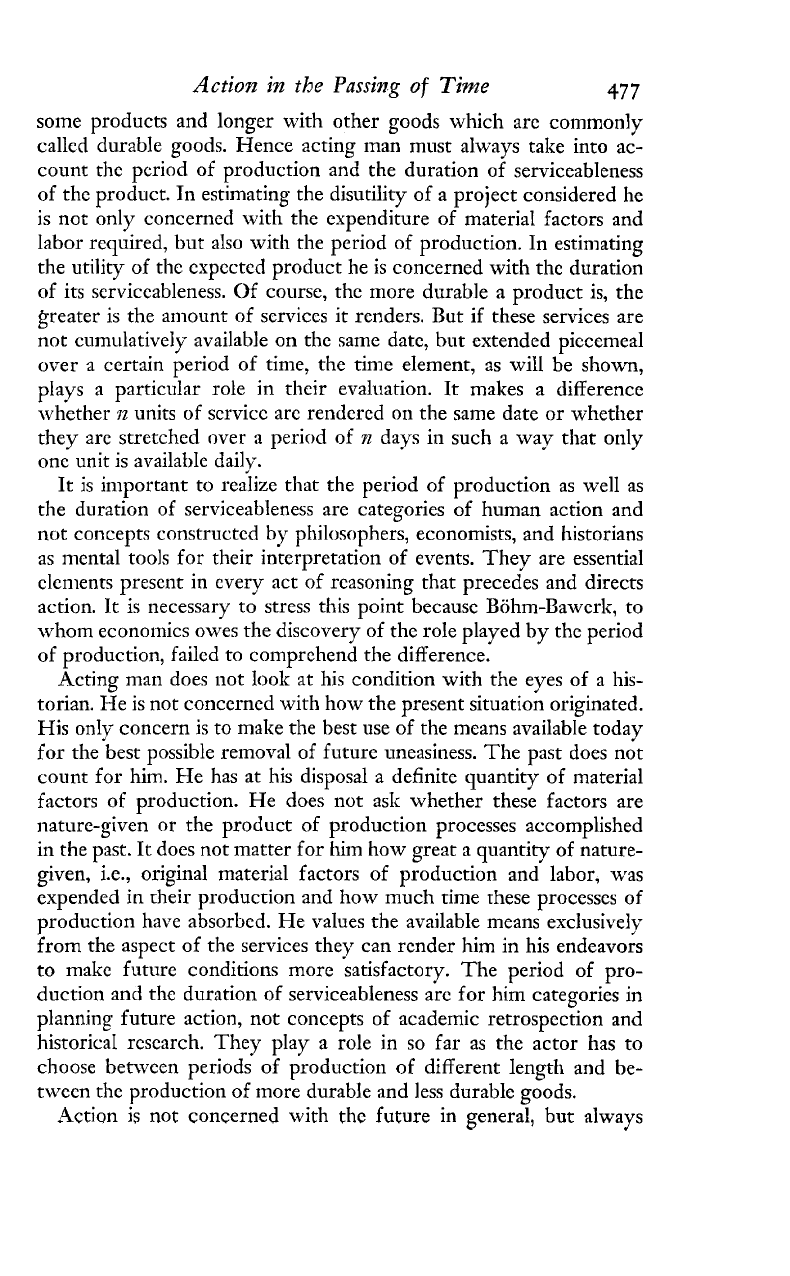
Action
in
the
Passing
of
Time
some products and longer with other goods which are commonly
called durable goods. Hence acting man must always take into ac-
count the period of production and the duration of serviceableness
of the product. In estimating the disutility of a project considered he
is not only concerned with the expenditure of material factors and
Iabor required, but also with the period of production. In estimating
the utility of the expected product he is concerned with the duration
of its serviceableness.
Of
course, the more durable
a
product is, the
greater is the amount of services it renders. But if these services are
not cumulatively available on the same date, but extended piecemeal
over a certain period of time, the time element, as will be shown,
pIays a particular role in their evaluation. It makes a difference
whether
n
units of service are rendered on the same date or whether
they are stretched over a period of
n
days in such a way that only
one unit is available daily.
It is important to realize that the period of production as well as
the duration of serviceableness arc categories of human action and
not concepts constructed by philosophers, economists, and historians
as mental tools for their in;erpretation of events. They are essential
elements present in every act of
reasoning
that precedes and directs
action. It is necessary to stress this point because Bijhm-Bawerli, to
whom economics owes the discovery of the role played by the period
of production, failed to comprehend the difference.
Acting man does not look at his condition with the eyes of a his-
torian. He is not concerned with how the present situation originated.
His only concern is to make the best use of the means available today
for the best possible removal of future uneasiness. The past does not
count for him. He has at his disposal a definite quantity of material
factors of production. He does not ask whether these factors are
nature-given or the product of production processes accomplished
in the past. It does not matter for him how great a quantity of nature-
given, i.e., original material factors of production and labor, was
expended in rheir producrion and how much rime these processes of
production have absorbed. He values the available means exclusively
from the aspect of the services they can render him in his endeavors
to make future conditions more satisfactory. The period of pro-
duction and the duration of serviceableness are for him categories in
planning future action, not concepts of academic retrospection and
historical research. They play
a
role in so far as the actor has to
choose between periods of production of different length and be-
tween the production of more durable and less durable goods.
Action is not concerned with
thc
future in general, but always
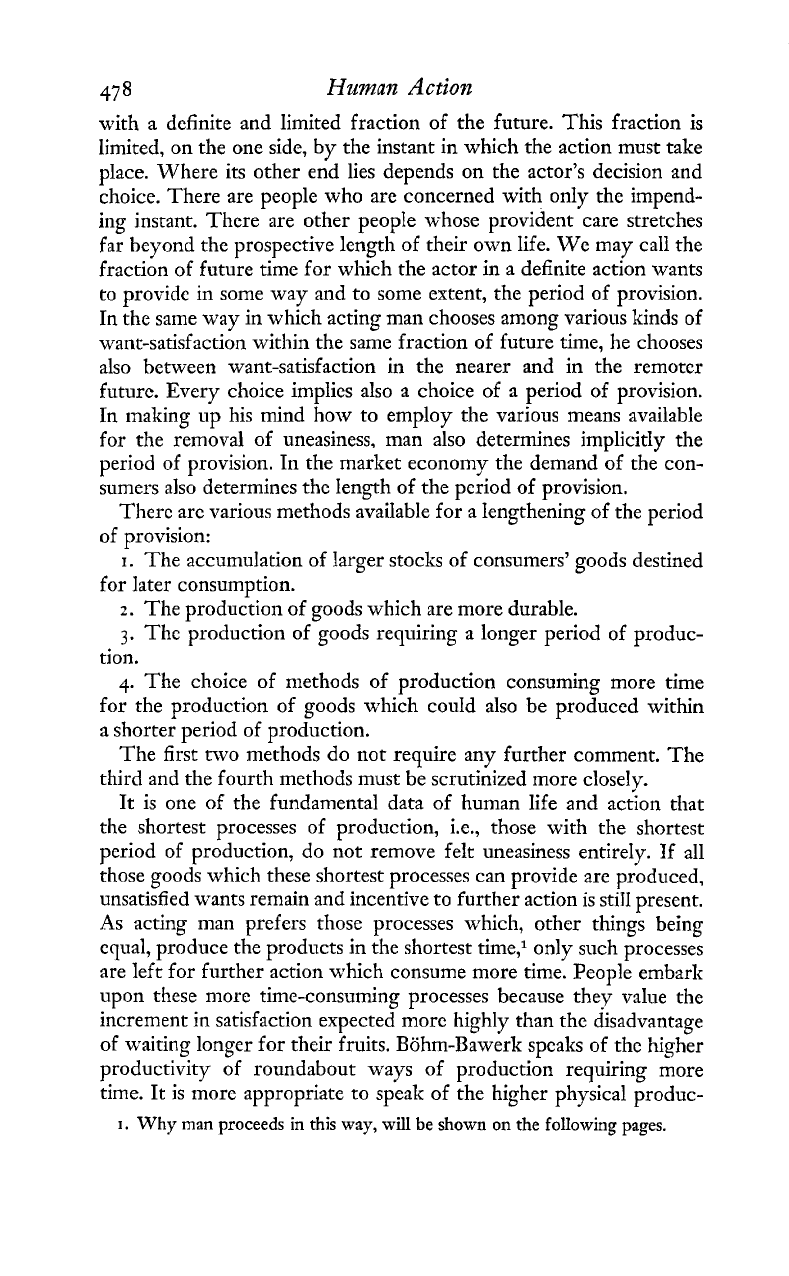
478
Human
Action
with a definite and limited fraction of the future. This fraction is
limited, on the one side, by the instant in which the action must take
place. Where its other end lies depends on the actor's decision and
choice. There are people who are concerned with only the impend-
ing instant. There are other people whose provident care stretches
far beyond the prospective length of their own life. We may call the
fraction of future time for which the actor in a definite action wants
to provide in some way and to some extent, the period of provision.
In the same way in which acting man chooses among various kinds of
want-satisfaction within the same fraction of future time, he chooses
also between want-satisfaction in the nearer and in the remoter
future. Every choice implies also a choice of a period of provision.
In ~naking up his mind how to employ the various means available
for the removal of uneasiness, man also determines implicitly the
period of provision. In the market economy the demand of the con-
sumers also determines the length of the period of provision.
There are various methods available for a lengthening of the period
of provision:
I.
The accumulation of larger stocks of consumers' goods destined
for later consumption.
2.
The production of goods which are more durable.
3.
The production of goods req~~iring a longer period of produc-
tion.
4. The choice of methods of production consuming more time
for the production of goods which could also be produced within
a shorter period of production.
The first two methods do not require any further comment. The
third and the fourth methods must be scrutinized more closely.
It is one of the fundamental data of human life and action that
the shortest processes of production, i.e., those with the shortest
period of production, do not remove felt uneasiness entirely. If all
those goods which these shortest processes can provide are produced,
unsatisfied wants remain and incentive to further action is stiii present.
As acting man prefers those processes which, other things being
equal, produce the products in the shortest tirne'l only such processes
are left for further action which consume more time. People embark
upon these more time-consuming processes because they value the
increment
in
satisfaction expected more highly than the disadvantage
of waiting longer for their fruits. Bohm-Bawerk speaks of the higher
productivity of roundabout ways of production requiring more
time. It is more appropriate to speak of the higher physical produc-
I.
Why man proceeds
in
this way, will
be
shown
on
the following pages.
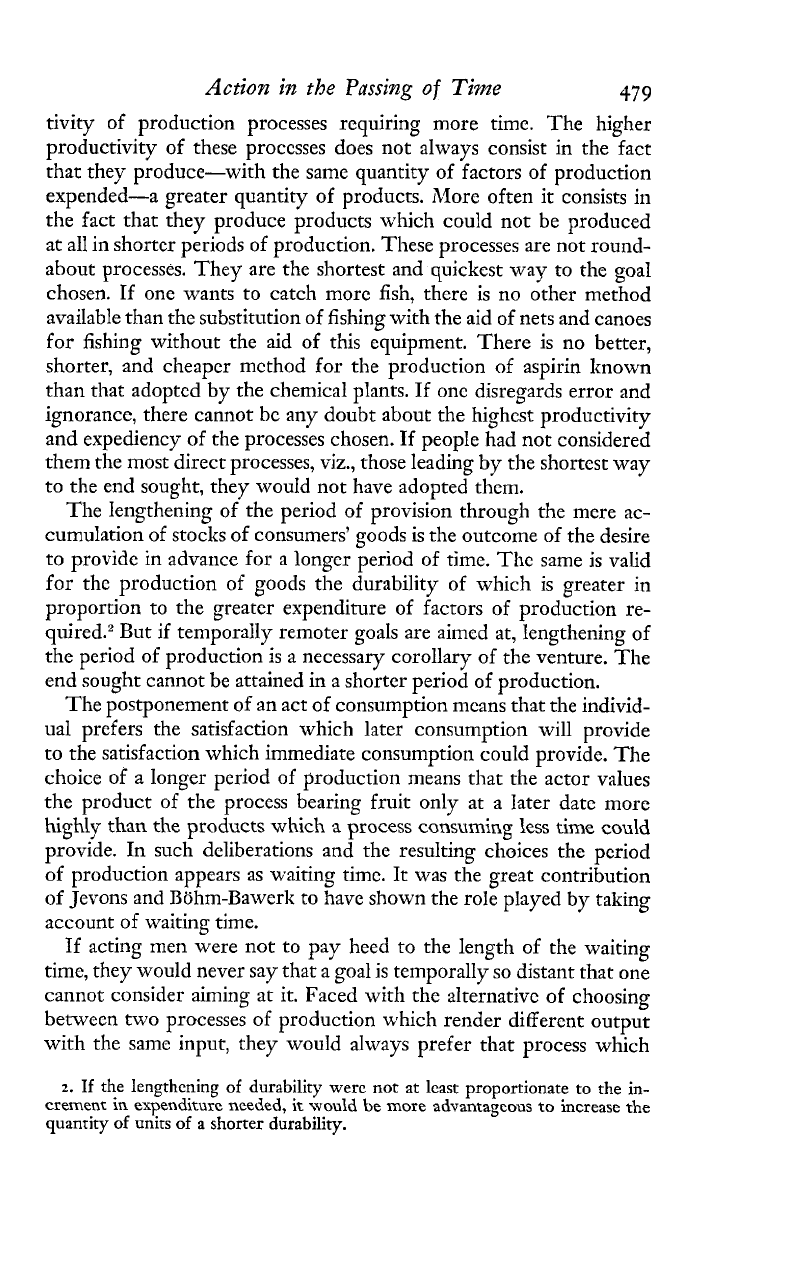
Action in the Passing
of
Tirne
479
tivity of production processes requiring more time. The higher
productivity of these processes does not always consist in the fact
that they produce-with the same quantity of factors of production
expended-a greater quantity of products. More often it consists in
the fact that they produce products which could not be produced
at all in shorter periods of production. These processes are not round-
about processes. They are the shortest and quickest way to the goal
chosen. If one wants to catch more fish, there is no other method
available than the substitution of fishing with the aid of nets and canoes
for fishing without the aid of this equipment. There is no better,
shorter, and cheaper method for the production
of
aspirin known
than that adopted by the chemical plants. If onc disregards error and
ignorance, there cannot be any doubt about the highest productivity
and expediency of the processes chosen. If people had not considered
them the most direct processes, viz., those leading by the shortest way
to the end sought, they would not have adopted them.
The lengthening of the period of provision through the mere ac-
cumulation of stocks of consumers' goods is the outcome of the desire
to provide in advance for a longer period of time. The same is valid
for the production of goods the durability of which is greater in
proportion to the greater expenditure of factors of production re-
q~ired.~ But if temporally remoter goals are aimed at, Iengthening of
the period of production is a necessary corollary of the venture. The
end sought cannot be attained in a shorter period of production.
The postponement of an act of consumption means that the individ-
ual prefers the satisfaction which later consumption will provide
to the satisfaction which immediate consumption could provide. The
choice of
a
longer period of production means that the actor values
the product of the process bearing fruit only at a later date more
highly
than the products which a process consuming less
time
could
provide. In such deliberations and the resulting choices the period
of production appears as waiting time. It was the great contribution
of Jevons and Bohm-Bawerk to have shown the role played by taking
account of waiting time.
If acting men were not to pay heed to the length of the waiting
time, they would never say that
a
goal is temporally so distant that one
cannot consider aiming at it. Faced with the alternative of choosing
between two processes of production which render different output
with the same input, they would always prefer that process which
z.
If
the lengthening
of
durability were not at least proportionate to the in-
crement
in
expenditure needed,
it
would
be more advantageous to increase the
quantity of units of
a
shorter durability.
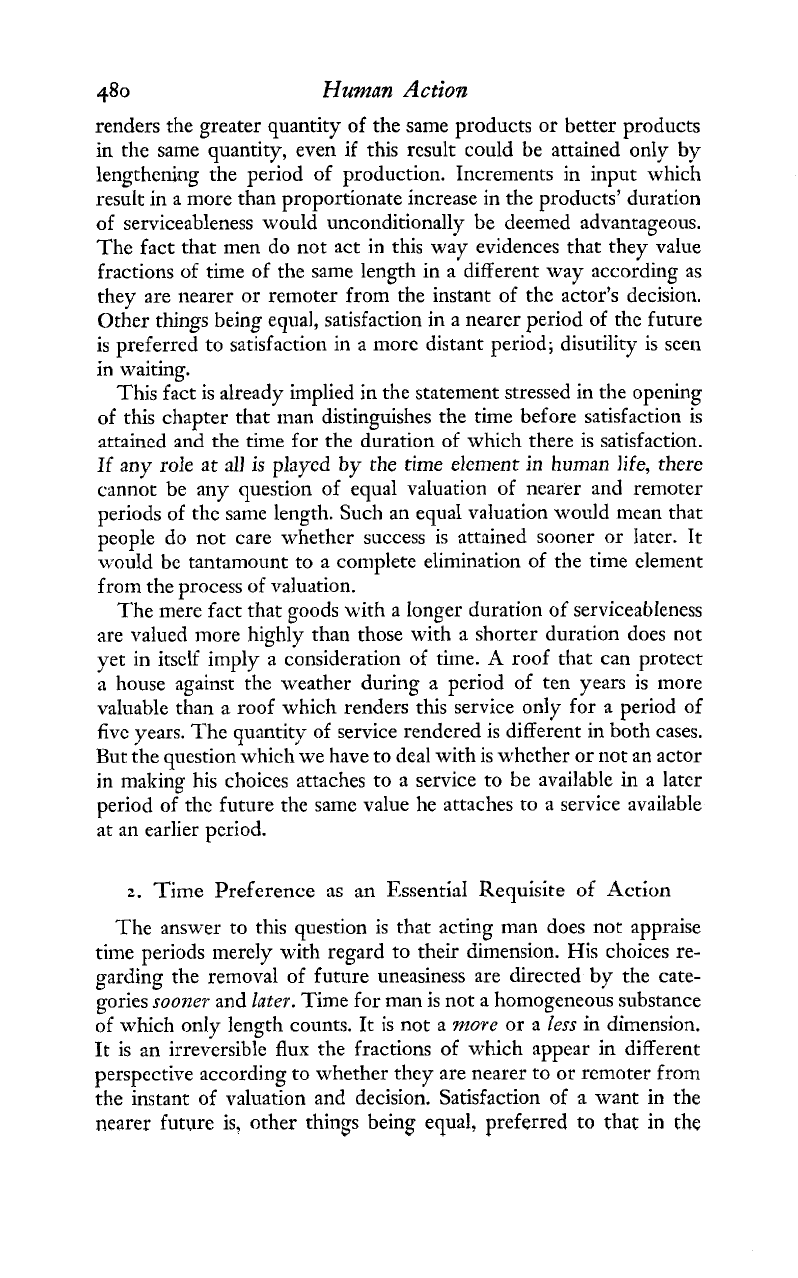
480
Human
Action
renders the greater quantity of the same products or better products
in the same quantity, even if this result could be attained onIy by
lengthening the period of production. Increments in input which
result in a more than proportionate increase in the products' duration
of serviceableness would unconditionally be deemed advantageous.
The fact that men do not act in this way evidences that they value
fractions of time of the same length in a different way according as
they are nearer or remoter from the instant of the actor's decision.
Other things being equal, satisfaction in a nearer period of the future
is preferred to satisfaction in a more distant period; disutility is seen
in
waiting.
This fact is already implied in the statement stressed in the opening
of this chapter that man distinguishes the time before satisfaction is
attained and the time for the duration of which there is satisfaction.
If
any role at all
is
played by the time
element
in
human
life, there
cannot be any question of equal valuation of nearer and remoter
periods of the same length. Such an equal valuation would mean that
people do not care whether success is attained sooner or later. It
would be tantamount to a complete elimination of the time element
from the process of valuation.
The mere fact that goods with a longer duration
of
serviceableness
are valued more highly than those with a shorter duration does not
yet in itsclf imply a consideration of ti~ne.
A
roof that can protect
a
house against the weather during a period of ten years is more
valuable than a roof which renders this service
only
for a period of
five years. The quantity of service rendered is different in both cases.
But the question which we have to deal with is whether or not an actor
in malting his choices attaches to a service to be available in a later
period of the future the same value he attaches to a service available
at an earlier period.
2.
Time Preference as an EssentiaI Requisite of
Action
The answer to this question is that acting man does not appraise
time periods merely with regard to their dimension. His choices re-
garding the removal of future uneasiness are directed by the cate-
gories
sooner
and
later.
Time for man is not a homogeneous substance
of which only length counts. It is not a
more
or a
less
in dimension.
It is an irreversible flux the fractions of which appear in different
perspective according to whether they are nearer to or remoter from
the instant of valuation and decision. Satisfaction of
a
want in the
nearer future is, other things being equal, preferred to that
in
the
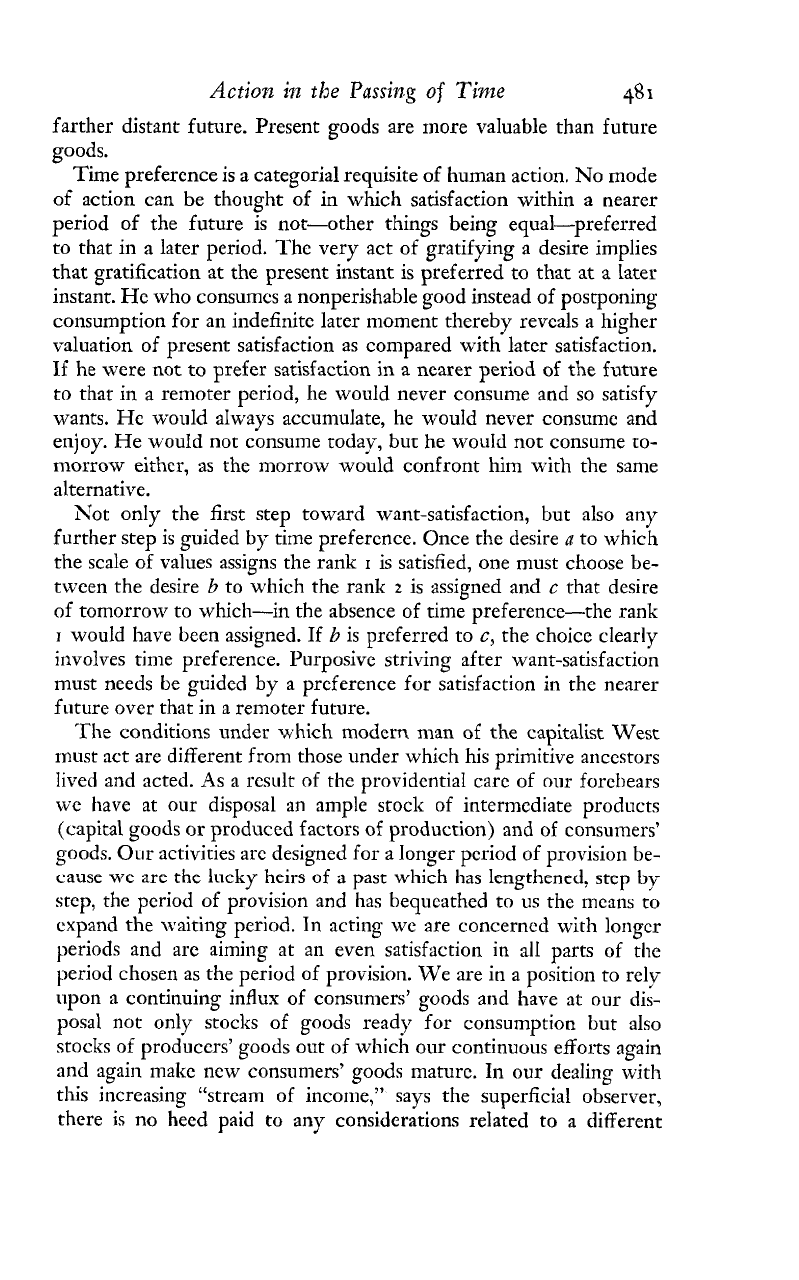
Action
in
the
Pnssin.g
of
Time
481
farther distant future. Present goods are more valuable than future
goods.
Time prefercnce is a categorial requisite of human action. No mode
of action can be thought of in which satisfaction within
a
nearer
period of the future is not-other things being equal-preferred
to that in a later period. The very act of gratifying a desire implies
that gratification at the present instant is preferred to that at a later
instant. He who consumcs a nonperishable good instead of postponing
consumption for an indefinite later moment thereby revcals a higher
valuation of present satisfaction as compared with later satisfaction.
If he were not to prefer satisfaction in
a
nearer period of the future
to that in a remoter period, he would never consume and so satisfy
wants. He would always accumulate, he would never consume and
enjoy. He wouId not consume today, but he would not consume to-
morrow either, as the morrow would confront
him
with the same
alternative.
Not only the first step toward want-satisfaction, but also any
further step is guided
by
time prefercnce. Once the desire
a:
to which
the scale of values assigns the rank
I
is satisfied, one must choose be-
tween the desire
b
to which the rank
2
is assigned and
c
that desire
of tomorrow to which-in the absence of time preference-the rank
I
would have been assigned. If
b
is preferred to
c,
the choice clearly
involves time preference. Purposive striving after want-satisfaction
must needs be guided by a preference for satisfaction in the nearer
future over that in a remoter future.
The conditions under which modern man of the capitalist West
must act are different from those under which his primitive ancestors
lived and acted. As a result of the providential care of our forebears
we have at our disposal an ample stock of intermediate products
(capital goods or produced factors of production) and of consumers'
goods. Our activities arc designed for a longer period of provision be-
cause we are the lucky heirs
of
a past which has lengthened, step
by
step, the period of provision and has bequeathed to us the meam to
expand the waiting period. In acting we are concerned with longcr
periods and are aiming at an even satisfaction in all parts of the
period chosen as the period of provision. We are in a position to relv
upon a continuing influx of consun~ers' goods and have at our dis-
posal not only stocks of goods ready for consumption but also
stocks of pro&ccrs' goods out of which our continuous efforts again
and again make new consumers' goods mature. In our dealing with
this increasing "stream of income," says the superficial observer,
there is no heed paid to any considerations related to a different
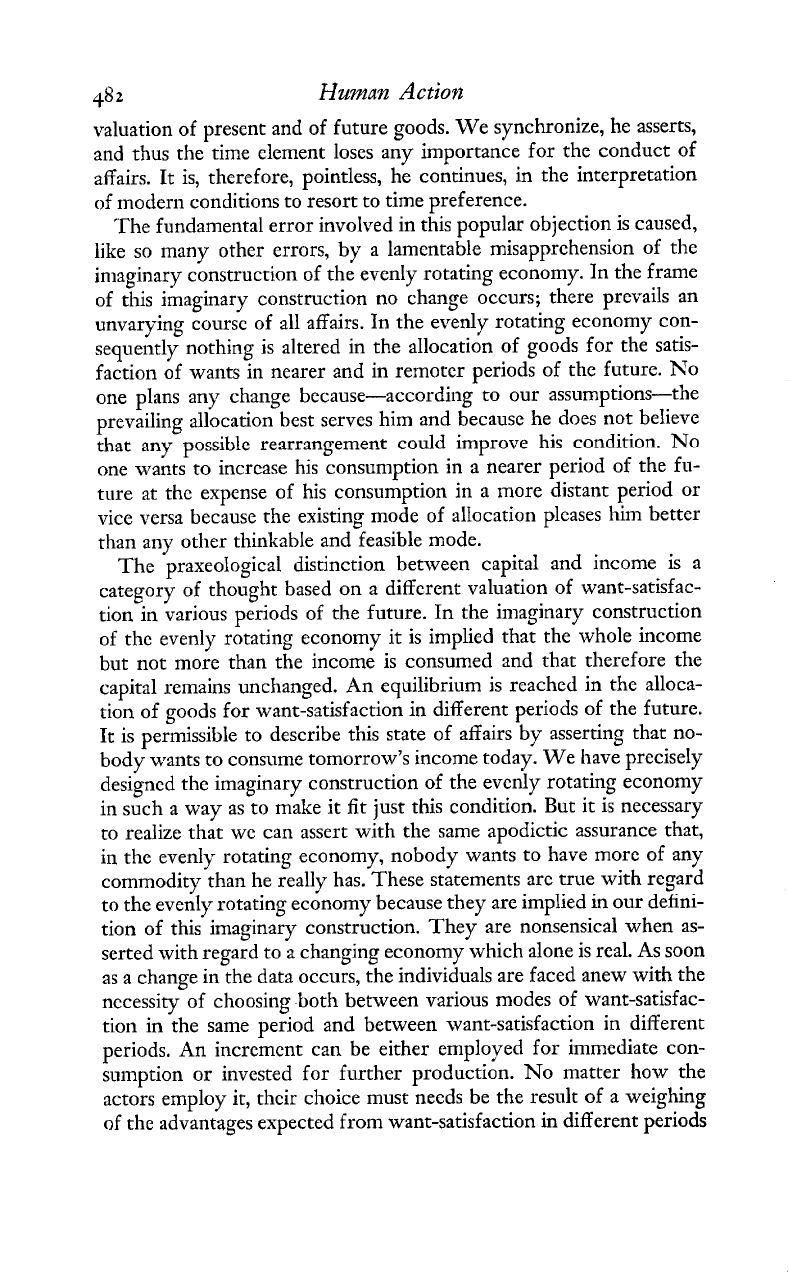
482
Human
Action
valuation of present and of future goods. We synchronize, he asserts,
and thus the time element loses any importance for the conduct of
affairs. It is, therefore, pointless, he continues, in the interpretation
of modern conditions to resort to time preference.
The fundamental error involved in this popular objection is caused,
like so many other errors, by a lamentable misapprehension of the
imaginary construction of the evenly rotating economy. In the frame
of this imaginary construction no change occurs; there prevails an
unvarying course of all affairs. In the evenly rotating economy con-
sequently nothing is altered in the allocation of goods for the satis-
faction of wants in nearer and in remoter periods of the future. hTo
one pIans any change because-according to our assumptions-the
prevailing allocation best serves him and because he does not believe
that any possible rearrangement could improve his condition. No
one wants to increase his consumption in a nearer period of the fu-
ture at the expense of his consumption in a more distant period or
vice versa because the existing mode of alIocation pleases him better
than any other thinkable and feasible mode.
The praxeological distinction between capital and income is a
category of thought based on a different valuation of want-satisfac-
tion in various periods of the future. In the imaginary construction
of the evenly rotating economy it is implied that the whole income
but not more than the income is consumed and that therefore the
capital remains unchanged. An equilibrium is reached in the alloca-
tion of goods for want-satisfaction in different periods of the future.
It
is permissible to describe this state of affairs by asserting that no-
body wants to consume tomorrow's income today. We have precisely
designed the imaginary construction of the evenly rotating economy
in such a way as to make it fit just this condition. But it is necessary
to realize that we can assert with the same apodictic assurance that,
in the evenly rotating economy, nobody wants to have more of any
commodity than he really has. These statements arc true with regard
to the evenly rotating economy because they are implied in our defini-
tion of this imaginary construction. They are nonsensical when as-
serted with regard to a changing economy which alone is real. As soon
as a change in the data occurs, the individuals are faced anew with the
necessity of choosing both between various modes of want-satisfac-
tion in the same period and between want-satisfaction in different
periods. An increment can be either employed for immediate con-
sumption or invested for further production. No matter how the
actors employ it, their choice must needs be the result of a weighing
of the advantages expected from want-satisfaction in different periods
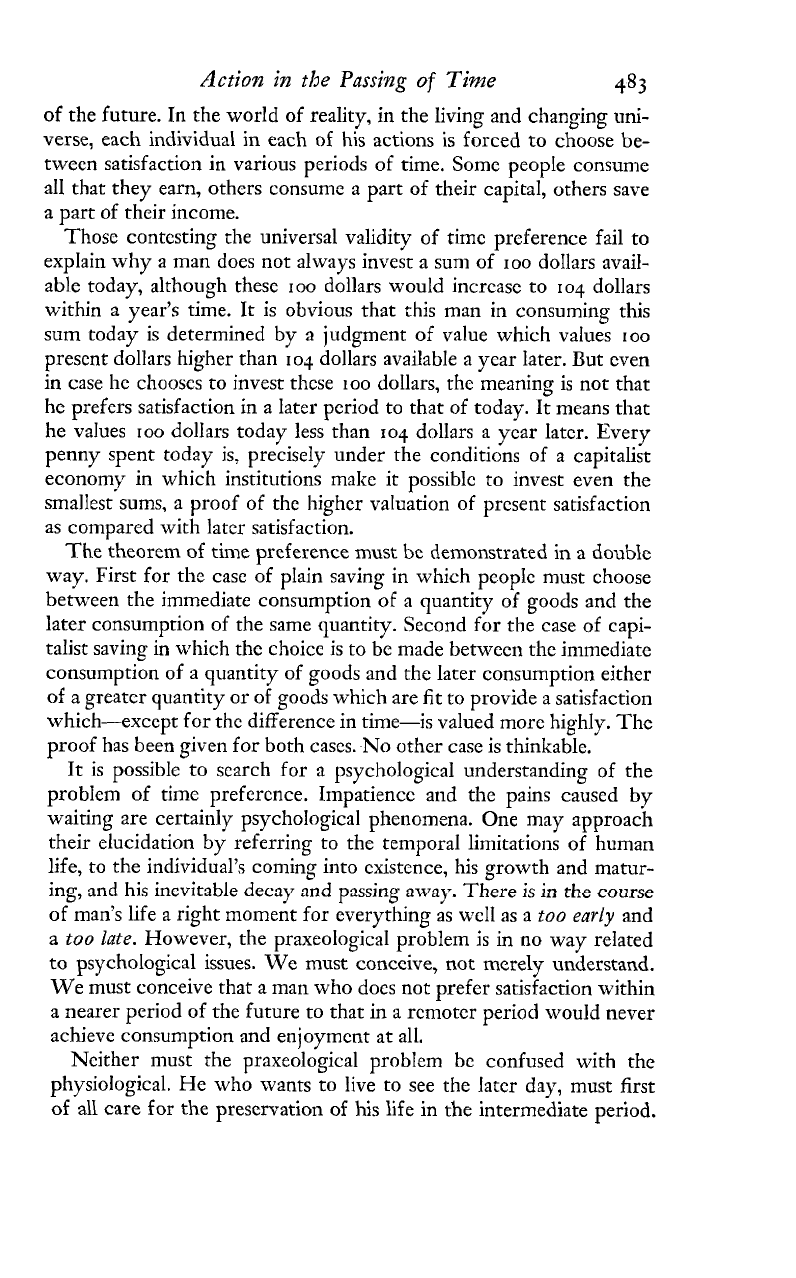
Action in the Passing
of
Time
of the future. In the world of reality, in the living and changing uni-
verse, each individual
in
each of
his
actions
is
forced to choose be-
tween satisfaction in various periods of time. Some people consume
all that they earn, others consume a part of their capital, others save
a part of their income.
Those contesting the universal validity of time preference fail to
explain why a man does not always invest a sum of ~oo dollars avail-
able today, although these ~oo dollars would incrcase to 104 dollars
within a year's time. It is obvious that chis man in consuming this
sum today is determined by a judgment of value which values loo
present dollars higher than
I
04 dollars available a year later. But even
in case he chooses to invest these loo dollars, the meaning is not that
he prefers satisfaction in a later period to that of today. It means that
he values roo dollars today less than 104 dollars a year latcr. Every
penny spent today is. precisely under the conditions of a capitalist
economy in which institutions make it possible to invest even the
smallest sums, a proof of the higher valuation of present satisfaction
as compared with later satisfaction.
The theorem
of
time preference must be demonstrated in a double
way. First for the case of plain saving in which people must choose
between the immediate consumption of a quantity of goods and the
later consumption of the same quantity. Second for the case of capi-
talist saving in which the choice is to be made between the immediate
consumption of a quantity of goods and the later consumption either
of a greater quantity or of goods which are fit to provide a satisfaction
which-except for thc difference in time-is valued more highly. The
proof has been given for both cases. No other case is thinkable.
It is possiblc to search for a psychological understanding of the
problem of time preference. Impatience and the pains caused by
waiting are certainly psychological phenomena. One may approach
their clucidation by referring to the temporal limitations of human
life, to the individual's coming into existence, his growth and matur-
ing, and his inevitable decay and passing away. There is in the course
of man's life a right moment for everything as well as a
too
early and
a
too
late.
However, the praxeological problem is in no way related
to psychological issues. We must conceive, not merely understand.
We must conceive that a man who docs not prefer satisfaction within
a
nearer period of the future to that in a rcmotcr period would never
achieve consumption and enjoyment at all.
Neither must the praxeological problem be confused with the
physiological. He who wants to live to see the later day, must first
of all care for the preservation of his life in the intermediate period.
